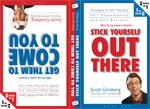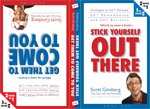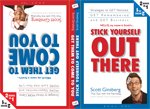 “Damn it! Now why didn’t I think of that?”
“Damn it! Now why didn’t I think of that?”
Wrong question.
Because odds are, you probably did think of that.
What I want to know is:
*Why didn’t you write it down when you thought of it?
*Why didn’t you Google the idea immediately to see if you were crazy?
*Why didn’t you register the domain of the idea to secure ownership and protection?
*Why didn’t you ask yourself if the idea solved a real, urgent, expensive and pervasive problem in a marketplace that had money to buy it?
That’s the easy part about being an entrepreneur: There are a million profitable things you could do – that anybody could have done – that nobody else has the guts, discipline and follow through to do.
The hard part is kindling your spark into a flame and using it to set world on fire.
Fortunately, I have some answers for you…
My name is Scott.
I’m the guy who wears a nametag everyday.
More importantly, I’m the guy who made a career out of wearing a nametag everyday.
And based on my experience of leveraging a simple idea into a six-figure income, I’m going to teach you how to take initiative on – and make money with – something obvious and simple that anybody could have done, but didn’t.1. Never underestimate the cash value of cool. The word “cool” dates back to tenor saxophonist Lester Young, who popularized the term in jazz circles in the late 1920’s. “Cool tune baby. I dig it,” he’d say.
And without explanation, people knew exaclty what he meant. If someone described a song or a person or a club as “cool,” that was enough to communicate its value.
Now, obviously, cool is a subjective term. It’s kind of like art or pornography: You know it when you see it. The secret is to embark on a consistent quest to learn about (and increase your present level of) coolness.
My suggestion: Pay attention to instances in which you or the people around you comment on cool stuff. Listen attentively. Note the commonalities. Keep a Cool Journal if you want.
The point is: Cool isn’t just unforgettable – it’s unconcealable. Even if you don’t know what your product is. Even if you don’t know what it will become. If you’re cool, that’s a priceless asset. How would Lester Young describe your website?
2. Keep the field of activity open. My company mantra is as followers: “Ideas are free, execution is priceless.” Therefore: It’s not (just) about knowing a good idea when you see it – it’s about executing that idea before anyone else sees it. This suggests two challenges:
First, you have to strengthen your eye for opportunity. That means using your eyes as allies. Seeing into the life of things. And carefully observing the problems that fall through the cracks.
The second challenge calls for a different sensibility. It’s about embracing the importance of sustained movement. It’s about solving problems quickly and publicly. And it’s about making sharp and decisive strokes without being sidetracked by secondary thought.
Ultimately, you don’t have to be good to get going, but you have to get going to get good. That’s the thing: We don’t need more idea people – we need more execution people. Which one are you?
3. Go where the party is already happening. How do you find the football field in a small town on an autumn weekend? Simple: You look for the lights. The same rule applies to marketing.
“You don’t create your own party and expect people to show up – you go where the whole town will be,” writes Robbin Phillips in Brains on Fire.
In short: You look for the lights. And the best place to start is within.
For example, the reason I started wearing a nametag everyday in college is because I was sick and tired of not being invited to parties because I didn’t drink.
Simple as that.
The nametag allowed people to get to know me as a person – not as choice.
For you, consider asking yourself: What disturbs you the most? What pisses you off beyond belief? That’s the pain that has most to offer. That’s where the party is already happening.
Focus on that, and you’ll accelerate your idea beyond belief. Otherwise your enterprise will remain a hopeless endeavor. A meaningless portal. A majestically useless and inconsequential occurrence.
Remember: Never underestimate the monetizability of momentum. What horse – that’s already winning the race – do you need to hitch a ride with?
4. Don’t back away from perceived negatives. My friend Julie owns a small town pharmacy. When she rented my brain, she expressed concern about a common customer complaint.
“People want Wal-Mart. And they get upset when they find out we don’t carry ten thousand items. But we’re a small shop and only stock the essentials.”
For that reason, I suggested a new positioning strategy:
No food. No drinks. No shirts. Just the medicine that matters. Your needs, filled.
Now the weakness is a strength.
What about you? What negative perceptions are you underleveraging?
For example, maybe you have a boring name. Fine. That means you can re-invent and become whatever you want. Terrible public speaker? No problem. Offer one-on-one, intimate coaching instead. Technologically illiterate? Cool. Keep your interface lean, simple and user-friendly.
Remember: A true artist makes use of everything that she is. How are you developing perceived weaknesses into defining strengths?
5. Design a plan to enable consistent promotion. That’s what I tell my clients: You don’t need a marketing plan – you need a visibility plan.
After all, anonymity is bankruptcy. And if you’re not staying in front of your top supporters consistently, all the initiative in the world won’t do you a bit of good. You’re still winking in the dark.
Now, I’m sure you’re smart enough to know how to maintain prime visibility with the people who matter. My suggestion is more of an attitudinal change.
And that brings us to Allison. She’s a fellow public speaker based out of Des Moines. During our last virtual lunch, I asked her about a recent gig she had in Sacramento.
“It sucked. All I did was give my speech. Which went great and everything – but I never got to see the city.”
And that’s when I reassured her, “Yeah, but the city got to see you.”
Lesson learned: Anytime you put yourself in a leadership position in front of the people who matter, you immediately become more yessable.
Everything you do is marketing. Everything. And you have an ongoing imperative to deliver value in a visible way. Do you need a marketing plan or a visibility plan?
In conclusion, we turn to The Hypomanic Edge: The Link Between a Little Craziness and a Lot of Success in America:
“Great entrepreneurs often do not create original ideas – they grasp the significance of an idea, wherever it comes from, and leap on it with everything the have.”
REMEMBER: Ideas are free – but only execution is priceless.
If you want to take initiative on (and make money with) something obvious and simple that anybody could have done – but didn’t – you know what you need to do.
Kindle your spark. Spin it into a flame.
And use it to set world on fire.
LET ME ASK YA THIS…
What idea have you executed in the past week?
LET ME SUGGEST THIS…
For the list called, “100 People (not) To Listen To,” send an email to me, and you win the list for free!
* * * *
Scott Ginsberg
That Guy with the Nametag
Author, Speaker, Entrepreneur, Mentor
[email protected]
 The world’s FIRST two-in-one, flip-flop book!
The world’s FIRST two-in-one, flip-flop book!
Buy Scott’s comprehensive marketing guidebook on Amazon.com and learn how to GET noticed, GET remembered and GET business!

 Few forces in the world burn brighter than a human being’s inherent hunger to contribute.
Few forces in the world burn brighter than a human being’s inherent hunger to contribute. The world’s FIRST two-in-one, flip-flop book!
The world’s FIRST two-in-one, flip-flop book! Few forces in the world burn brighter than a human being’s inherent hunger to contribute.
Few forces in the world burn brighter than a human being’s inherent hunger to contribute. The world’s FIRST two-in-one, flip-flop book!
The world’s FIRST two-in-one, flip-flop book!